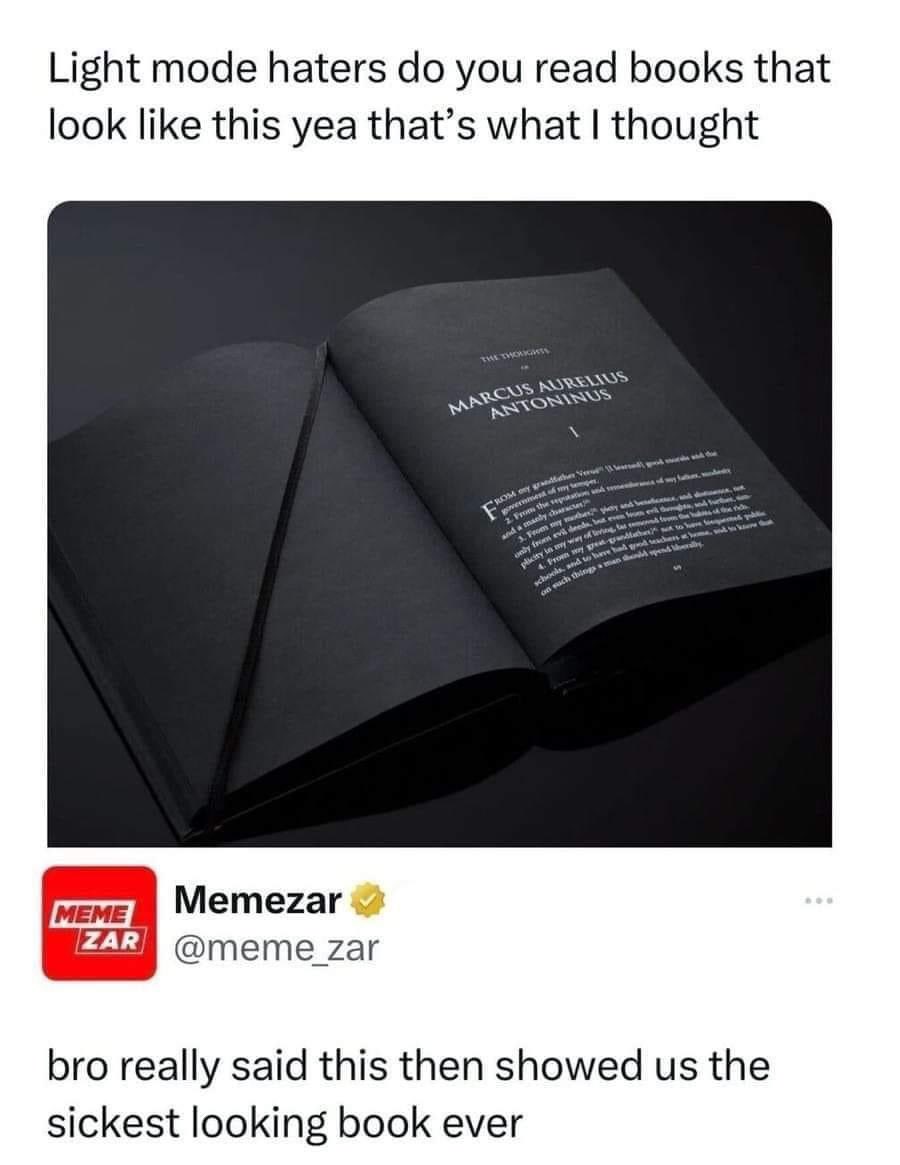this post was submitted on 16 Nov 2023
1901 points (99.0% liked)
Funny: Home of the Haha
5696 readers
1131 users here now
Welcome to /c/funny, a place for all your humorous and amusing content.
Looking for mods! Send an application to Stamets!
Our Rules:
-
Keep it civil. We're all people here. Be respectful to one another.
-
No sexism, racism, homophobia, transphobia or any other flavor of bigotry. I should not need to explain this one.
-
Try not to repost anything posted within the past month. Beyond that, go for it. Not everyone is on every site all the time.
Other Communities:
-
/c/TenForward@lemmy.world - Star Trek chat, memes and shitposts
-
/c/Memes@lemmy.world - General memes
founded 1 year ago
MODERATORS
you are viewing a single comment's thread
view the rest of the comments
view the rest of the comments

Books use the color scheme they do because it's cheaper to print black ink on white paper than white ink on black paper. Digital displays don't have that limitation.
Except OLED. It's better for OLED to show white text on black background.
Every software needs a "just turn off the pixels that aren't displaying anything" mode for OLED. Way too many "dark modes" are just dark grey which still keeps the background pixels powered.
Yes, because full black/white contrast is harsher on the eyes than a dark grey with white or light-grey text. For power/efficiency, black pixels definitely makes sense, but concerning user experience and eye strain, there are many good reasons certain color palettes are used.
Obviously not every single OLED panel can be tested for this if the manufacturers don't do it themselves, but a few places tested OLED/AMOLED phones and found slate grey is close enough to full black in power savings. Since then I just choose the most visually pleasing theme as some full black themes are really poorly designed.
Fair enough, a choice between both options is always better.
It's usually referred to as "OLED Dark mode". Discord has it for an example
Is it though? Wouldn't that cause a burn in faster?
No because the white parts are what will burn in. Black is the off state for OLED. This is also why many apps for Lemmy (and previously reddit) have a dark theme option for OLED devices that uses full black instead of grey so that the pixels not in use are fully off.
Exactly, and because the rest is off you'll notice it earlier. It still depends on how long those pixels are on though. The longer they're on the more they degrade.
If the whole display is on all of the pixels would degrade eventually, but you'll notice it less because they all degrade.
If you have the same pixels on all the time then yes you'd have faster burn in. However, since you'd be looking at different text, this degradation would be spread over the different pixels. Not uniformly, but good enough that it doesn't matter for practical usage.
How about we really break the bank and just print an entire black page on white paper.
In all seriousness that's not usable because the ink will have a tendency to bleed and fill the voids that make up the letters.
Explain eink screens
E-ink actually doesn't as it only uses power when pixels change between black and white and not when it's displaying a static image. E-ink uses the same amount of power rendering white text on black as black text on white. However, white text is more common since e-ink is specifically meant to imitate printed pages, and assuming it's not backlit, also doesn't have nearly as bad eye strain issues when in light mode as a glowing screen does.
It only has to update the parts where the words changed and it only uses the energy to initially change the screen. It literally uses more energy doing full screen wipes (flashing between black and white three or four times) to avoid ghost images. It would significantly reduce the need for a refresh if it was mostly black.
Our eyes are more sensitive to variations in lighter colors after all.